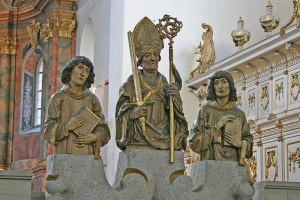Sant Killian
Un article de GrandTerrier.
1 Fiche signalétique
|
2 Almanach
| |||||||||||||||||||||
3 Sources
|
4 Iconographie | |||||||||||||||||||||
5 Monographies
prénoms celtiques et bretons d'Albert Deshayes :
Killian
Ce serait une forme diminutive de l'irlandais ceallach, "lutte, contestation".
D'origine irlandaise, mais attesté en Bretagne sous les graphies Chillian dès 1163 et Killian en 1332, ce saint est un évêque missionnaire venu d'Irlande et l'un des premiers martyres à Wurzburg. Ses reliques étaient conservées à l'abbaye Sainte-Sauve de Montreuil-sur-Mer (62).
Site fr.Wikipedia :
Kilian, Colman et Totnan
Les saints Kilian, Colman et Totnan sont des moines irlandais qui ont évangélisé la Franconie entre 680 et 689 et sont morts martyrs à Wurtzbourg en 689. Fête le 8 juillet.
Saint Kilian est né dans le comté de Cavan en Irlande, vers 640. En 686, il se rend à Rome où on pense qu'il a été sacré évêque missionnaire. Ses compagnons Colman et Totnan sont ordonnés respectivement prêtre et diacre. Le pape les charge d'évangéliser les Franconiens qui sont restés païens.
À Wurtzbourg, les missionnaires convertissent un grand nombre de gens dont le duc Gosbert qui doit, avant de recevoir le baptême, renoncer aux liens qui le lient avec sa belle-sœur Geilane. Cette femme en conçoit une telle rancune contre les Irlandais qu'elle profite d'une absence de Godbert pour organiser leur assassinat.
Au VIIIe siècle, c'est saint Burchard, évêque de Wurtzbourg, qui ordonne le transfert des reliques des trois martyrs dans sa cathédrale.
Site en.Wikipedia :
Saint Kilian
Saint Kilian, also spelled Killian or Cillian, was an Irish missionary bishop and the apostle of Franconia (nowadays the northern part of Bavaria), where he began his labors towards the end of the 7th century. There are several biographies of him. The oldest texts which refer to him are an 8th century necrology at Würzburg and the notice by Hrabanus Maurus in his martyrology. According to Maurus, Kilian was a native of Ireland, whence with eleven companions he went to eastern Franconia and Thuringia. After having preached the gospel in Würzburg, he succeeded in converting to Christianity the local lord, Duke Gozbert, and much of the population. Killian eventually told the Duke that he was in violation of sacred scripture by being married to his brother's widow, Geilana. According to local tour directors in Wuerzburg, Geilana (who Kilian had failed to convert to Christianity) heard of Kilian's words against her marriage, and was furious. Of noble blood herself, she had her own loyal troops. She dispatched these to the main square of Wuerzburg, where Kilian and his colleagues were preaching, and had Killian beheaded, along with two of his companions, Saint Colman (also called Colman, Colonan or Kolonat) and Saint Totnan. It is difficult to fix the date with precision, as Duke Gozbert and Duchess Geilana are only known of through a these two somewhat imprecise Church record. The elevation of the relics of the three martyrs was performed by Burchard, the first Bishop of Würzburg. The skulls of the three martyrs were inlayed with precious stones and carefully preserved to this day. On St Kilian's day, a glass case containing the three skulls is removed from a crypt, paraded through the streets before large crowds, and put on display in the town's cathedral (Sankt-Kiliansdom). Statues of these three saints (among others) line the famous Saint's Bridge across the Main River.
Kilian was born in Mullagh, Co Cavan, Ireland and is the patron saint of the parish of Tuosist, near Kenmare County Kerry where he is believed to have resided before travelling to Germany. A church and holy well are named after him and his feast day, July 8th, is traditionally celebrated with a pattern when crowds visit the well for prayers, followed by evening social events.
The name can get confused in spelling (e.g. Chillian, Killian, Cilian, Kilian). In Ireland, the preferred spelling is Cillian; the name appears thus in the Irish liturgical calendar. Saint Killian's feast day is July 8th, and he is usually portrayed, as in his statue at Würzburg, wearing a bishop's crozier and wielding a sword. He is one of the patron saints for sufferers of rheumatism.
Killian is still in use as a given name in Ireland, the USA and the Franconian portion of Germany.
